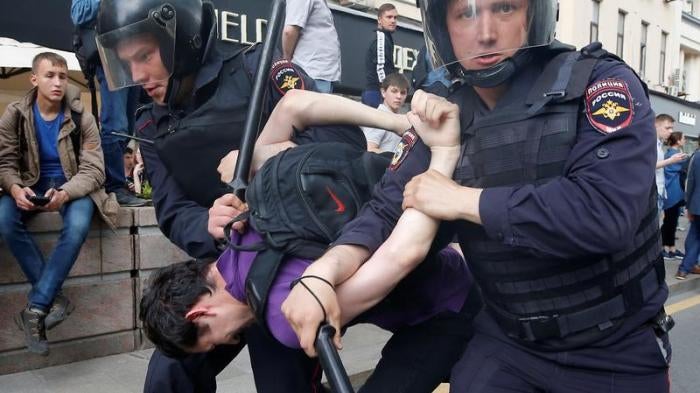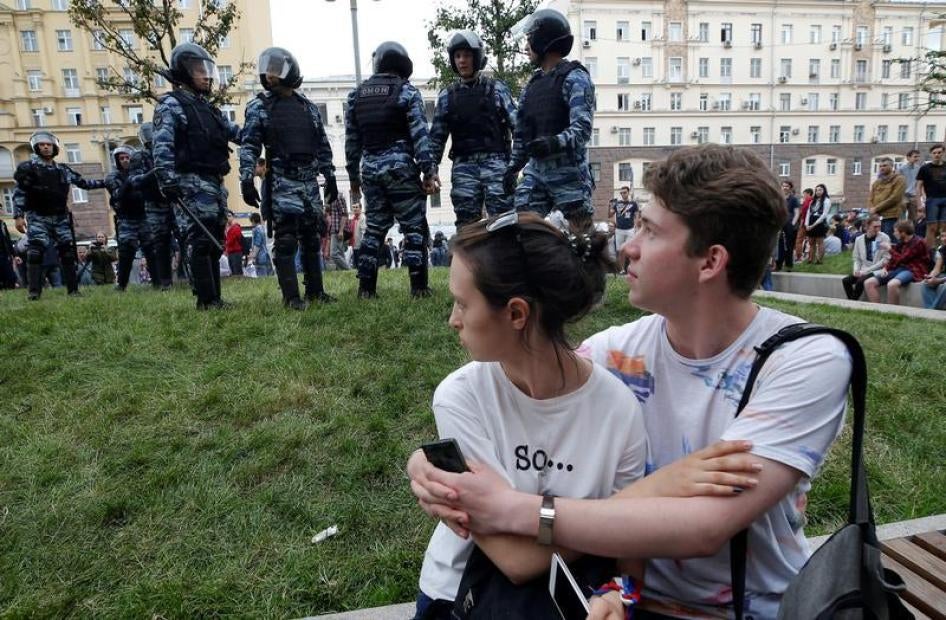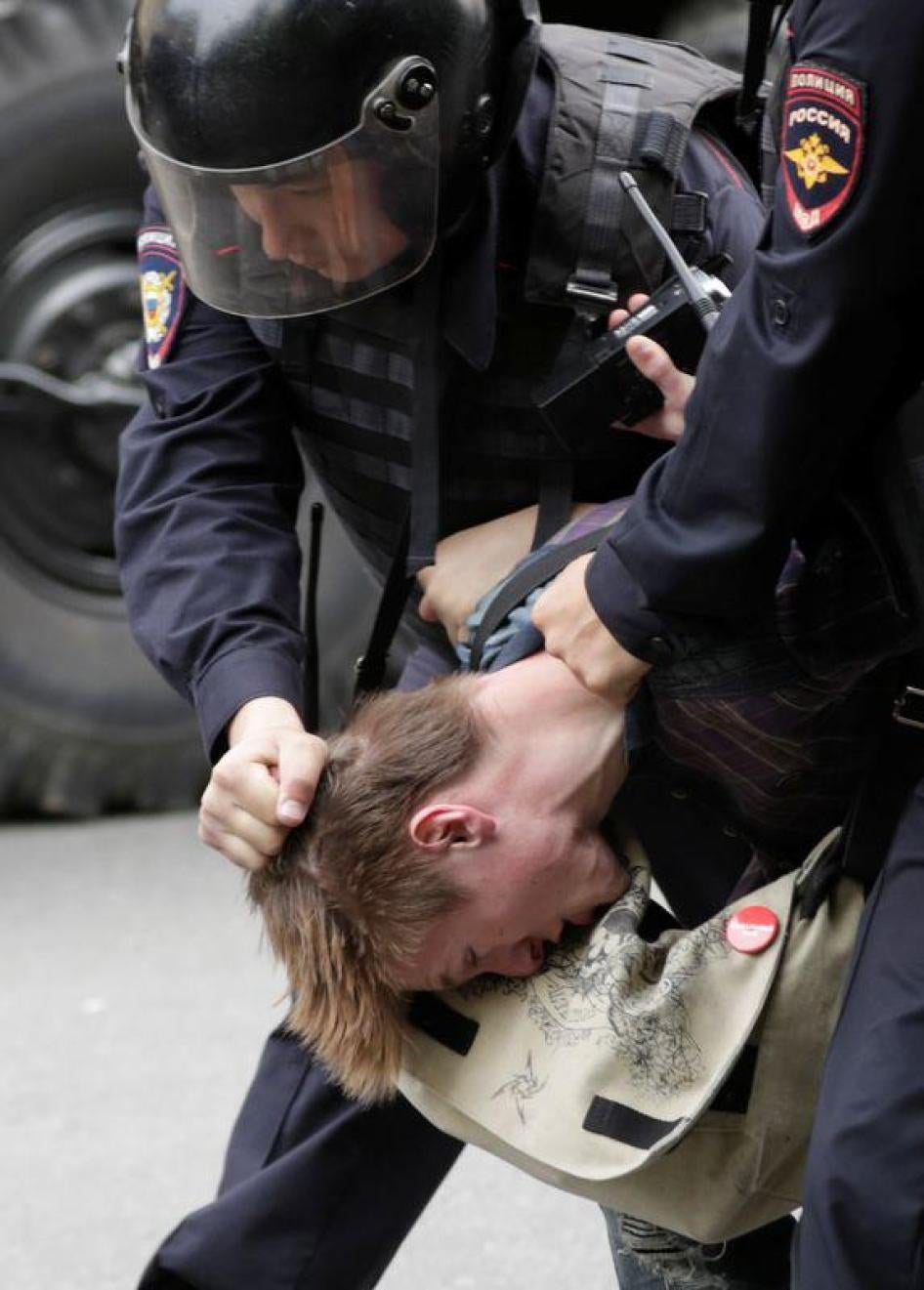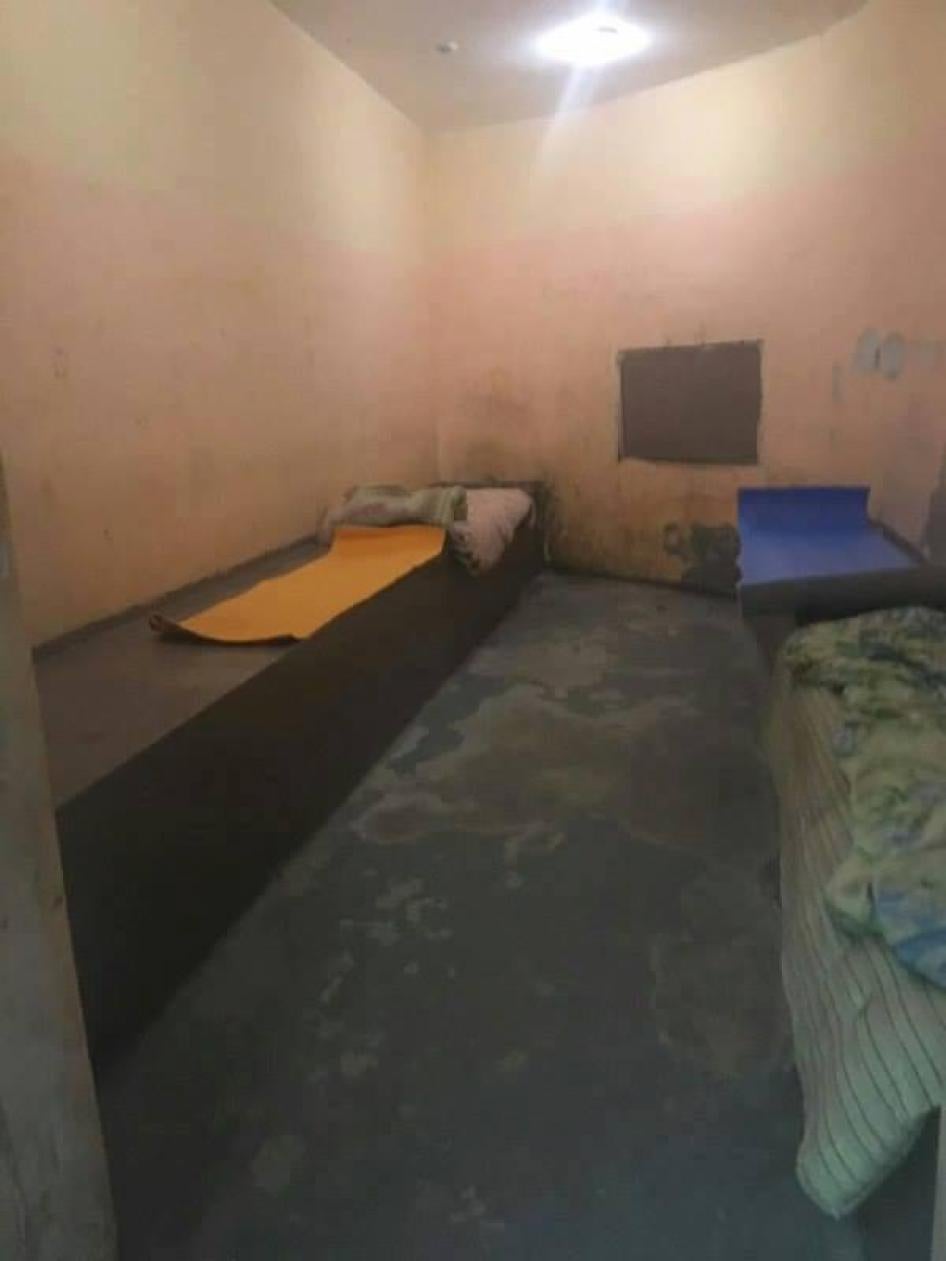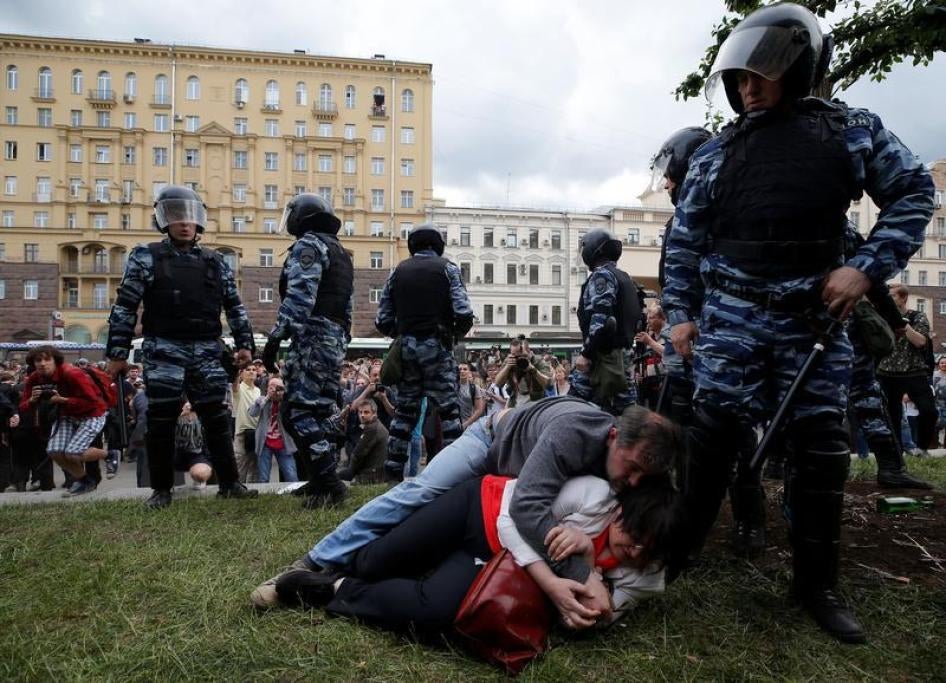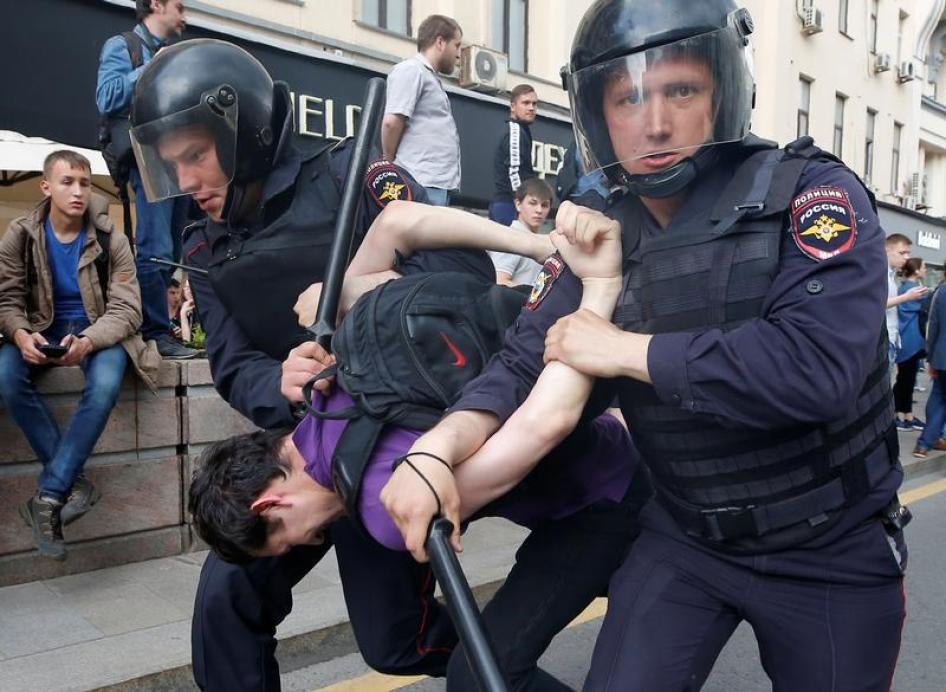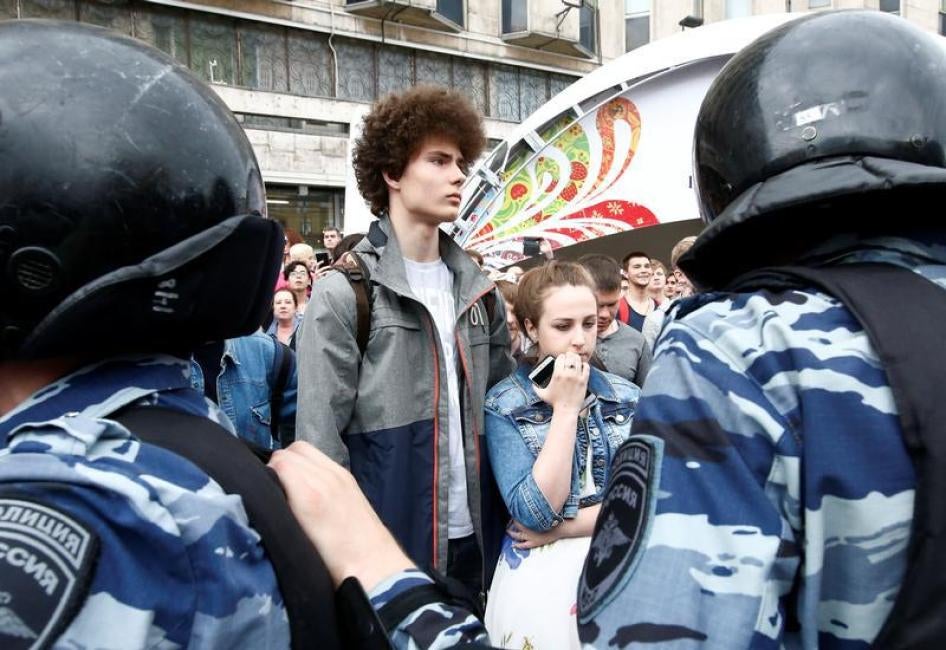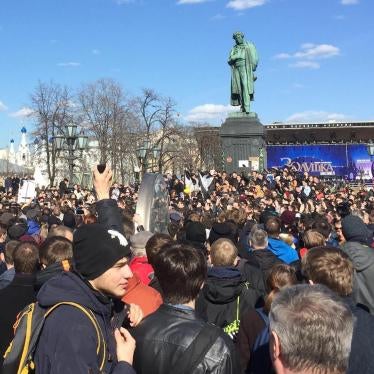(Moscow) – Russian police arbitrarily detained hundreds of people during peaceful protests on June 12, 2017, in Moscow and St. Petersburg, Human Rights Watch said today. Human Rights Watch interviewed more than a dozen people detained during the protests.
Human Rights Watch interviewed nine people who were detained in Moscow and released several hours later, either without charge or pending court hearings. One protester interviewed in Moscow spent a week in hospital with a concussion and other trauma after a riot police officer hit her. We also interviewed four people who were detained in St. Petersburg and spent between 30 and 50 hours in police custody in severely overcrowded cells that lacked proper sanitation and other basic necessities. Protesters, rights advocates, and lawyers in both cities told Human Rights Watch that riot police officers’ badges were hidden by bulletproof vests, so it was impossible to identify them and they ignored protesters’ requests to identify themselves.
The protesters detained in St. Petersburg were held at precincts that were not designed to accommodate large numbers of overnight detainees. Detainees had to take turns sleeping on the floor or in chairs. They had to rely on rights activists to bring them food and drinking water. Police officials at some of the precincts denied lawyers and lay advocates access to their clients. Police officials who take people into custody have an obligation to provide them with decent accommodations and to meet their basic needs, Human Rights Watch said.
Detainees in both cities described identical, rubber-stamped police charge sheets. Not all those charged had had their administrative court hearings by the time they spoke with Human Rights Watch, but most of those who did were fined between 3,000 and 15,000 rubles (about US$50 to US$250) and/or sentenced to up to 15 days in detention. In some cases, authorities in St. Petersburg would not allow lay advocates, journalists, and observers into the courtrooms where hearings were held.
Russia is a party to the European Convention on Human Rights (ECHR) and the International Covenant on Civil and Political Rights (ICCPR), both of which guarantee the right to peaceful assembly, as does the Russian constitution. The European Court of Human Rights (ECtHR), has repeatedly emphasized that a lack of authorization for a peaceful protest does not justify infringements on freedom of assembly, but rather that the authorities should show tolerance toward protesters.
The ECtHR has also made it clear that the freedom to take part in a peaceful assembly is so important that participants should not be subjected to any penalty – even at the lower end of the scale – for participation in a demonstration that has been prohibited, so long as the person does not commit any individual reprehensible act. The government also has a duty to investigate and remedy violations of the right to assembly.
“Peaceful protesters shouldn’t be detained in the first place, nor should they be beaten or abused or held in dreadful conditions,” Lokshina said. “Russian authorities should uphold the rule of law and ensure accountability for excessive use of force and other violations against peaceful protesters.”
June 12 Protests in Moscow and St. Petersburg
June 12 was Russia Day, a public holiday. Moscow authorities had approved an anti-corruption rally on that day on Sakharov Avenue in the city center. However, on June 11, one of the key organizers, leading opposition politician Alexei Navalny, announced that the authorities had interfered with the construction of the stage and delivery of sound equipment and called on his supporters to gather at Tverskaya Street, Moscow’s main thoroughfare, at 2 p.m. Moscow authorities warned those intending to follow Navalny’s call that Tverskaya Street was the site for the official Russia Day festivities and that police would not allow any unsanctioned gatherings there.
The head of Moscow’s department for regional security described Navalny’s call as provocative. Riot police detained Navalny just after 1 p.m, on June 12 and on June 13, a Moscow court sentenced him to 30 days in detention for repeated violations of regulations on public gatherings. On June 16, an appeals court reduced the sentence to 25 days. The approved demonstration on Sakharov Avenue took place without any police interference.
The authorities in St. Petersburg refused to approve an anti-corruption rally at Marsovo Polye, in the city center, for which the organizers had filed a notification well in advance. Citing official festivities at that location, officials suggested that the protesters gather in Udelny Park, on the city’s outskirts. Organizers rejected this option due to its remote location and went ahead with the original plan, despite the authorities’ warnings that protesters would be detained.
Mass Detentions
There was a large-scale police presence at both unapproved protest sites. The exact numbers of protesters in both cities are difficult to estimate but the scope of detentions was clearly massive.
Moscow city authorities estimated that about 5,000 protesters came to Tverskaya Street. It is difficult to assess this estimate, considering that the protesters joined the crowds gathered there for official festivities. According to OVD-Info, a prominent independent group monitoring arbitrary detentions and police abuse, Moscow authorities detained 866 protesters. According to Moscow’s regional security department, 132 of those detained were under age 18.
The children were released to their parents on the same day. All except 32 of the adult detainees were released from custody before midnight or just after, either without charge or pending administrative court hearings for violating regulations on public gatherings. A spokesman for OVD-Info, Grigory Okhotin, told Human Rights Watch that the 32 protesters held overnight included prominent political activists who were charged with disobeying police orders and violating regulations on public gatherings. Most were sentenced to between seven and 15 days in detention.
In St. Petersburg, local authorities estimated that at least 3,500 people participated in the protests, while the organizers spoke of larger numbers. According to OVD-Info, police in St. Petersburg detained 658 people. Alexandra Krylenkova, a leading activist with the St. Petersburg Support Group for Detainees (SGD), an ad hoc coalition of local rights groups and volunteers, told Human Rights Watch that “the only people the police authorities released by the end of the day were those under 18 and people with disabilities.”
The authorities released the children to their parents, bringing administrative proceedings against some of the parents for “failure to execute child-rearing responsibilities.” The 542 people not released that day spent one or two nights in police custody awaiting court hearings. With very few exceptions, they were charged with violating regulations on public gatherings and disobeying police orders. About 150 of them were sentenced to one to 15 days of detention; the rest were fined.
Peaceful Protests, Violent Response
The protests in Moscow and St. Petersburg were peaceful. The only violent incident in Moscow occurred when a 17-year-old boy allegedly sprayed pepper gas into the face of a riot police officer. Law enforcement authorities opened a criminal investigation, and on June 16 a Moscow court placed the teenager under house arrest.
In St. Petersburg, authorities detained a 17-year-old youth activist with Yabloko, a liberal political party in opposition to the Kremlin, and put him under house arrest for allegedly hitting a riot policeman in the face and breaking his tooth. However, a publicly available video of the incident shows the policeman slipping and hitting his chin on the boy’s head as a group of police attempt to detain the boy. Authorities in St. Petersburg also put under house arrest a 32-year-old man who had allegedly hit a riot police officer on the back with his fist. The officer was wearing a bulletproof vest and was not injured.
Riot police in some cases used excessive force against protesters in both cities. Some of the beatings and other abuse took place in full view of observers who filmed them with video cameras and cellphones. People were also ill-treated next to or inside police buses.
The spokespeople for OVD-Info and SGD, 13 of those detained in both cities, and a protester who successfully fled police in St. Petersburg, all told Human Rights Watch that when detaining peaceful protesters, the riot police did not distinguish between those who held political posters or chanted slogans and those who were simply standing there. All said that the police seemed to be trying to detain as many protesters as possible.
“They detained everyone they could get their hands on,” one St. Petersburg protester said. “The only reason I wasn’t detained is that I managed to escape the riot policemen who were chasing me.”
Numerous videos from both protests reviewed by Human Rights Watch show protesters singing songs, including Russia’s national anthem, waving Russian flags, holding hands, dancing, and sometimes chanting political slogans, but not engaging in any aggressive behavior.
Nikita Chorny, 18, who was detained in St. Petersburg just 15 minutes after he had arrived at Marsovo Polye, said he just “stood there quietly without any posters.” Riot police officials encircled a group of protesters, pushing them close together, then pulling some people out of the crowd and taking them to police buses parked nearby. Chorny was among those randomly picked out.
Yulia Galyamina, 44, a civic activist who was hit by a riot policeman in Moscow, and her husband, Nikolai Tuzhilin, 47, said that at about 4:50 p.m. police moved in on peaceful protesters who had gathered near the Izvestia building on Tverskaya Street. They said police effectively encircled a crowd of up to a thousand protesters. Most were simply standing there, but in the middle of the crowd a group of 100 to 200 activists, mainly youth, walked in a circle singing. Once in a while, some of them would shout an anti-corruption slogan.
Tuzhilin said:
Nothing was happening really, and we were about to leave… Then [riot police] just moved on the crowd snatching people and dragging them off. It seemed like they were trying to quickly round up as many as possible. We were in the center of a large group of people… and I was hugging Yulia from behind to prevent [police] from dragging her off. Some of us formed a chain to make it more difficult [for the police] to pick us off, one by one.
Galyamina said that a policeman hit her in the face as the police were breaking up the chain of protesters. She lost consciousness for a few seconds. When Galyamina came to, she and her husband, who had been holding on to her, were both lying on the ground. Galyamina spent a week in a hospital. Doctors diagnosed a concussion, bruising to the upper rib cage, and traumatic dislocation of three teeth, which Galymina said felt “wobbly.”
Tuzhilin was detained. He said that police officials put him up against the police bus and kicked him hard on his legs, causing bruising. Police released Tuzhilin from custody just after 11 p.m., pending court hearing for violating regulations on public gatherings. On June 20, Galyamina filed a complaint with the Investigation Committee of the Russian Federation, the country’s chief investigative agency, detailing police abuse against her and her husband.
Lucy Shteyn, 21, a candidate in the September Moscow municipal council election, was detained by riot police on Tverskaya Street at about 4 p.m. She also said that police circled and squeezed people together:
Occasionally, they took some random ones from the crowd and dragged them off. At some point, riot police started pushing protesters into the underground pass… People were falling on each other and then… I was suddenly very close to some riot policemen and they started pushing me with their truncheon. I said that I had the right to stand where I was and there’s no reason for me to move... I asked why they were pushing me.
Two police officials then detained Shteyn and she spent about four hours at a police precinct. She said her court hearing on violating public gatherings regulations was pending.
Irina Murtazina, 19, said she was detained in St. Petersburg though she wasn’t involved with the protest. She told Meduza, an independent online media outlet, that riot police officials “hit [her] with a truncheon and kicked [her].” A court subsequently sentenced her to eight days in detention.
Most of those Human Rights Watch interviewed said that riot police officials’ badges were hidden by bulletproof vests, so it was impossible to identify them. Police ignored protesters’ requests to identify themselves. This situation is typical for police detentions at public rallies in Russia and is a severe obstacle to holding police accountable for beatings and other ill-treatment.
Passersby, Journalists, and Rights Advocates Detained
Two protesters detained in Moscow said that several people in the police buses with them said they had not been protesting but happened to be at the wrong place at the wrong time. OVD-Info also published the personal stories of several detained people who apparently had nothing to do with the protest. One of them alleged riot police officials beat him on the ribs with a truncheon.
Krylenkova told Human Rights Watch that among the detainees in St. Petersburg there were, for example, a man from out of town who was out for a stroll with his wife and small daughter, a young woman waiting for her date, several journalists, and several human rights activists, including two members of SGD who were there to monitor the protest and help those arbitrary detained:
This was unprecedented. I’ve monitored many [unsanctioned] public gatherings in St. Petersburg and the police tended to be selective, typically going after the most active protesters, those who chanted slogans. But on June 12 it was totally open season – they just grabbed everyone who didn’t manage to dodge them, including even those who were not involved in the protest.
Two members of President Putin’s Human Rights Council, Ella Polyakova and Natalia Evdokimova, who were observing the rally in St. Petersburg, were also detained, dragged into a police bus, and taken to a police precinct. Following the intervention of high-level officials, both were quickly released without charge.
Journalists detained in St. Petersburg included Ksenia Morozova from Sobaka.Ru and David Frenkel, a photographer working with Kommersant Daily and Mediazona. Both were covering the rally and had press cards. Police also detained Varvara Mikhaylova, 25, an activist with SGD, when she urged police not to detain Frenkel.
Frenkel was released the same day without charge. Ksenia Morozova, on whose behalf the St. Petersburg Union of Journalists intervened with the authorities, was nevertheless charged with violating regulations on public gatherings and disobeying police orders. She was sentenced to 10 days’ detention and fined 12,000 rubles (about US$200).
Denis Styazhkin, 29, a journalist and civic activist, said that he was covering the Tverskaya protest, had no poster, and chanted no slogans. He was taking pictures of protesters being detained when police officials arrested him. He showed his press card and explained that he was on assignment. “They ordered me onto a police bus, claiming they just wanted to run an identity check, but once I was inside, they started treating me like a regular detainee,” Styazhkin said. He spent several hours at a police precinct and was finally released without charge.
Detainees Held in Poor Conditions
In St. Petersburg, law enforcement authorities unjustifiably kept most of the detainees in custody until their court hearings. Local police precincts were clearly unable to cope with the staggering number of detained protesters as they were not equipped to hold that many detainees overnight, let alone for two nights. They had no showers and insufficient space. Detainees had to take turns sleeping, some on the floor, others in hard seats. The toilets were dirty. The detainees interviewed described stagnant air, stench, filth, and sleep deprivation.
SGD provided protesters in custody with sleeping mats, bottled water, nonperishable food, and other basic necessities that the authorities did not provide despite being responsible for the well-being of those in their custody. At some of the precincts, police officials told detainees that they had no budget to feed them. One detainee said that when she asked for hot water so that she and other detainees could make instant noodle soup delivered by volunteers, the police refused, leaving the detainees with a choice of eating dry noodles or going hungry.
Krylenkova, who spoke with many of the detainees, said:
Some of the police precincts were hell…. No beds, nothing. It was stuffy to the point of suffocation. The smells… The condensation on the walls… No place to wash and the stink getting worse and worse with so many people stuck there for one night, then two nights… going practically without sleep all that time.
Several detainees described being held overnight in conference rooms. Mikhaylova, the SGD activist arrested when urging police to release a journalist, said that during the first of the two nights she spent detained in St. Petersburg, 16 protesters had to share six beds, and on the second night police officials simply told them to sleep on chairs in the hallway with the lights on. “It was incredibly agonizing,” she said. “No one could get any sleep the first night and on the second night everyone was in a state of delirium. Some were taken to court in the middle of the night…”
Asta K., 29, an SGD activist who observed the rally at Marsovo Polye, said that riot police detained him at 3:40 p.m., when he attempted to pass a folder with legal guidelines into a police bus holding 33 detainees. The officials pushed him inside the bus, where he remained as the bus was dropping off small groups of detainees at various police precincts. Asta K. was in the last group to be dropped off, at 11:30 p.m. Asta K. said that during the eight hours on the bus the detainees had only limited access to water and their requests to go to the toilet were denied. They spent the first night in a precinct assembly hall sitting on chairs. At about 6 a.m., police officials took them to the cells, where they could sleep either on the bare floor or on a thin mat.
OVD-Info reported that police at precinct #33 in St. Petersburg used pepper spray on a detainee who had not been a protester and who was screaming and throwing his body against his cell’s walls. The gas spread to the rest of the holding area through the ventilation system, affecting all the 17 detained protesters. OVD-Info published excerpts of accounts from several affected protesters. One said:
We began to suffocate… The [young women] who were with me [in the same cell] started knocking [on the door], begging [police officials] to … help us. One of them opened [the door] and then closed it again. …I [was] trying to inhale and could not… Finally, they [police] let us out into some tiny supply closet with a window. . .[Police] refused to call us an ambulance… One of the detained men managed to sneak a phone into the cell, so he called for the ambulance.
When the ambulance arrived, medical workers intervened with the police and the officials unlocked the cell with the men and took all of the detainees into the basement, where they had to sleep on chairs and remained until about 8 p.m. the next day.
Chorny, the teenager arrested at random in St. Petersburg, had to be briefly hospitalized when, after 30 hours in police detention, his blood pressure spiked. Police called an ambulance and he received hospital treatment. Chorny went home from the hospital, but two weeks later he received a police summons in the mail requiring him to go to the precinct and speak with police regarding his charges. The authorities informed him that his court hearing on violating regulations on public gatherings had been scheduled for July 5. Chorny chose not to attend the court hearing and was sanctioned in absentia for violating regulations on public gatherings.
The eight protesters Human Rights Watch interviewed who had been detained in Moscow had no complaints about the detention conditions and police conduct at the precincts. One of them said:
Once we got to the police station it was basically bureaucratic drudgery – the waiting, the compiling of charges … Over 20 of us [detainees] were brought there, and I was stuck longer than three hours [the time allowed by Russian law] but they [police] apologized and said they were doing their utmost to process the papers as fast as possible. They were polite, did not bait us, did not make any inappropriate comments.
This description is consistent with accounts from other Moscow detainees interviewed. However, OVD-Info reported that among the three dozen Moscow protesters held overnight, three spent the night outdoors in the courtyard of the Alexeevsky precinct because the police “had no space for them inside” with seven other protesters already “hosted” there.
Administrative Court Hearings
The Moscow protesters interviewed were still waiting for their administrative court hearings or had been released without charge. All the St. Petersburg protesters interviewed, except Chorny, had already had their court hearings, which they said were rushed and fraught with procedural violations. Judges rubber-stamped police allegations in their rulings without taking into account the defense arguments or giving the defense an opportunity to argue their position. Some of the hearings were in effect closed to journalists and observers, and in some cases lawyers and lay advocates could not access detainees.
Three detainees who spent between 30 and 50 hours in police custody in St. Petersburg said that by the time their court hearings took place they were incoherent from exhaustion and barely had the energy to protest procedural violations, which included lack of access to their lawyers or lay advocates.
One of them summarized her own court experience, and what she observed:
Some of us were taken to court in the middle of the night. And many of those hearings lasted for several minutes. So, what sort of justice can be there?... [Many] people had no legal aid. Their lay representatives were prevented from participating in the hearings. Judges did not let journalists and observers into the courtrooms. Some of the hearings were practically closed. And then the detainees were simply slapped with very similar sanctions.
SGD’s representatives attended numerous court hearings. Summing up the group’s observations in courts, Krylenkova said that in some cases the authorities denied lay representatives and observers access to courtrooms. She also said that defense attorneys were generally allowed to represent their clients in court, but that law enforcement officials hinted to some detainees who had professional lawyers that the lawyers’ participation would only result in tougher sanctions against them.
Asta K., the SGD activist, said that police officials took him to court late at night on July 13, after close to 36 hours in detention. The court did not take into account the arguments he presented, including that he was an observer, not a participant, and fined him 15,200 rubles (about US$253).
Asta K. said:
The charge sheet [reviewed by Human Rights Watch] basically said I was in the crowd of people shouting anti-government slogans and carrying banners. And that made me a participant. It’s just absurd. But the court apparently didn’t think so… I feel lucky that, unlike so many others, I got away with only a fine.”
Methodology
Human Rights Watch interviewed 13 people who were detained at the June 12 protests in Moscow and St. Petersburg, two protesters (one from each city) who did not spend any time in police custody, as well as two lawyers representing several detained protesters. Human Rights Watch also interviewed several representatives of nongovernmental organizations in Moscow and St. Petersburg that were working to document police abuses at public protests and provide support to detained protesters. Human Rights Watch informed interviewees of the purpose of the interview, that they would receive no personal service or benefit, and that the interviews were completely voluntary. Interviewees gave oral informed consent to be interviewed. All the interviews were carried out in Russian by a native speaker of Russian. Human Rights Watch also studied several charge sheets and medical documents and carried out extensive social media and press monitoring.
